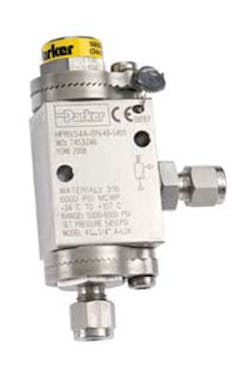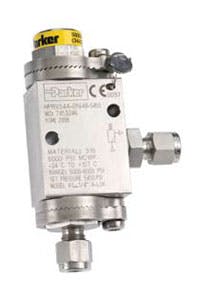Pressurized fluids frequently are used to perform work in hydraulic, pneumatic, and material-transport systems. Failures in fluid systems can result in property damage, personal injury, or worse, death.
Consequently, it’s critical to follow safe practices in assembling and working with pressurized systems and their components.
A new interactive training program, SafetyWorks, offered by Parker and its authorized distributors, is designed for people who order, install, maintain, or work with or near fluids under pressure and/or systems in motion, including equipment operators, repair- service technicians, assemblers, safety managers, and engineers. The program is aimed at helping workers prevent injury and property damage from escaping fluids and component fai lures in f lui d systems.
Three 20 to 30 minute long, highly collaborative modules make up the program. They can be delivered within an existing training schedule or used as a supplementary program. Individual modules are designed to instruct participants to:
- follow proper hose assembly and routing guidelines to help prevent premature failures,
- implement a product-selection process for safe and efficient fluid-systems design and use, and
- avoid injection injuries and understand the importance of timely treatment should an injection injury occur.
Instructional materials include, a participant’s workbook for each module and such support materials as videos and product samples, in cluding an SAE Hose Applications CD, a “Safety Shots” video, and PowerPoint presentation documenting an actual injection injury.
These materials have been developed so that sessions can be held anywhere in a facility, from around a workbench to a more formal conference or training room setting. Recommended class size for each module is between eight and 10 participants.
Throughout each session, training participants are encouraged to share stories and experiences relevant to the content of each module to help reinforce the importance of the material being presented and how it relates to their jobs. Classes are meant to be two-way discussions between the students and the facilitator.
|
Injection injuries are serious business Injection injuries occur when a fluid under pressure escapes through a pin-hole leak in a hydraulic or other pressurized system and penetrates a person’s skin. Injection injuries differ from other workplace injuries in that the initial injury may seem minimal, but if it is not assessed and treated properly and quickly, the results can be devastating. The injected fluid, including hydraulic fluid, grease, and oils, often does not cause any immediate reaction. The injured person may only feel a stinging sensation or no pain at all. Despite this, the fluid can quickly begin to destroy tissue, which can lead to gangrene and the need for amputation, and in some instances, death. What may appear to be a small puncture wound or cut can actually be a life-threatening injury that demands immediate treatment. Medical professionals classify injection injuries as a surgical emergency. Anyone suspected of having an injection injury should be taken to a hospital immediately. The sooner treatment is provided, the less chance a long-term disability will occur. First and foremost, be sure emergency room personnel are aware that a fluid injection injury has occurred. In addition, the following details can aid in treatment of an injection injury and should be provided to medical personnel:
|
Relief valve offers universal protection
Parker Hannifin’s Instrumentation Div., Barnstaple, UK, has developed a PED-certified, proportional relief valve that can provide protection over a pressure range of 150 to 6000 psig (10.3 to 414 bar). It is certified to Europe’s Pressure Equipment Directive (PED), which covers a wide range of applications, including hydraulic fluid power equipment. In fact, it meets the PED’s highest level of Category IV.
Parker will set and test the new valve at the factory to specific application pressures and laser etch the valve body with the cracking pressure. The valve provides a simple fit-and-forget solution for adding reliable safety and environmental and equipment protection to a wide variety of applications because it needs no testing or calibration by the end user.
Designated HPRV, the new valve is available with 0.142-in. (3.6 mm) flow ports. At the heart of the valve is a captured seat design that is blowout and chip resistant and works across the valve’s entire operating pressure range. It accommodates pressures to 8000 psig (552 bar) during relief.
Color-coded springs configure the valve for eight cracking pressure ranges from 150-375 to 4975-6000 psig (10.3-24.1 to 345-414 bar). Fine adjustment can then be adjusted by the end user via an external nut, which is secured in position by Parker's Tru-Loc mechanism and a lock wire to eliminate the possibility of accidental movement and guard against tampering.
Compared to some other relief valves, the HPRV provides higher resolution of cracking pressure settings, which can be maintained to within 3% of the setting. Precision and repeatability is also aided by the valve's balanced poppet design, which ensures consistent cracking operation regardless of system backpressure to 2000 psig (138 bar).
The standard valve comes with integral A-Lok compression tube ends, eliminating threaded connections and the potential problems associated with thread sealants. Other end styles can also be specified to suit the installation, such as single-ferrule CPI end connectors for imperial and metric tube sizes, and male or female NPT threaded inlet/ outlet ports. The valve's outlet port can be configured to duct media to a safe place, or release over-pressures to atmosphere.
O-rings adapt the valve to different media at temperatures from –57 to 204° C (–70° to 400° F). Because HPRV valves are 100% PED certified, they require no additional paperwork or approvals.
"For this relief valve design we went back to the drawing board and created a universal solution that will function at pressures up to 6000 PSI, which accounts for the vast majority of instrumentation applications," says Mat Davis of Parker Instrumentation.
About the Author

Leaders relevant to this article:

